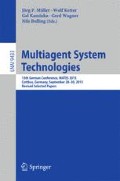Abstract
A growing network of technical systems, embedded and autonomous, influence our daily work. Among them, cyber-physical systems establish a close connection between the virtual and the real world. In this paper we show how an existing multiagent system that controls the physical production of goods on a monorail is virtualized by extracting the agents as black boxes and by integrating them into a multiagent simulation system. As a result, the exact same agents run in physical and cyber world. Towards this end, the physical environment has been mapped and visualized. Experiments show that the modeling and simulation error is small, such that scenarios can be varied, tested, debugged, and scaled, saving huge amounts of labor.
Access this chapter
Tax calculation will be finalised at checkout
Purchases are for personal use only
Notes
- 1.
Bremer Institut für Produktion und Logistik GmbH.
- 2.
- 3.
References
Bellmann, R.E., Zadeh, L.A.: Decision-making in a fuzzy environment. Manage. Sci. 17(4), 141–164 (1970)
Bracht, U., Geckler, D., Wenzel, S.: Digitale Fabrik: Methoden und Praxisbeispiele. Springer, Heidelberg (2011)
Broy, M.: Cyber-physical systems. In: Broy, M. (ed.) acatech DISKUTIERT. Springer, Heidelberg (2010)
Burkhard, H.D.: Liveness and fairness properties in multi-agent systems, pp. 325–330, August 1993
Carlsson, C., Fullér, R.: Fuzzy multiple criteria decision making: Recent developments. Fuzzy Sets Syst. 78, 139–153 (1996)
Fleisch, E., Mattern, F. (eds.): Das Internet der Dinge - Ubiquitous Computing und RFID in der Praxis. Springer, Heidelberg (2005)
Franklin, S., Graesser, A.: Is it an agent, or just a program?: a taxonomy for autonomous agents. In: Müller, J.P., Wooldridge, M.J., Jennings, N.R. (eds.) Intelligent Agents III Agent Theories, Architectures, and Languages. Lecture Notes in Computer Science, vol. 1193, pp. 21–35. Springer, Heidelberg (1997)
French, S.: Fuzzy decision analysis: some criticisms. In: Zimmermann, H.J. (ed.) TIMS/Studies in the Management Sciences, vol. 20, pp. 29–44. Elsevier Science Publishers, Amsterdam (1984)
Fujimoto, R.: Parallel and Distributed Simulation Systems. Wiley, New York (2000)
Gaines, B., Zadeh, L.A., Zimmermann, H.J.: Fuzzy sets and decison analysis - a perspective. In: Zimmermann, H.-J. (ed.) TIMS/Studies in the Management Sciences, vol. 20, pp. 3–8. Elsevier Sciences Publishers, Amsterdam (1984)
Ganji, F., Morales-Kluge, E., Scholz-Reiter, B.: Bringing agents into application: intelligent products in autonomous logistics. In: Schill, K., Scholz-Reiter, B., Frommberger, L. (eds.) Artificial Intelligence and Logistics (AiLog) - Workshop at ECAI 2010, pp. 37–42 (2010)
Gehrke, J., Schuldt, A.: Incorporating knowledge about interacting for uniform agent design for simulation and operation. In: AAMAS, pp. 1175–1176 (2009)
Greulich, C., Edelkamp, S., Gath, M., Warden, T., Humann, M., Herzog, O., Sitharam, T.G.: Enhanced shortest path computation for multiagent-based intermodal transport planning in dynamic environments. In: Filipe, J., Fred, A. (eds.) ICAART 2013, vol. 2, pp. 324–329. SciTePress, Barcelona (2013)
Kagermann, H., Wahlster, W., Helbig, J.: Umsetzungsempfehlungen für das Zukunftsprojekt Industrie 4.0. Abschlussbericht des Arbeitskreises Industrie (2013)
Klügl, F.: Multiagentensimulation - Konzepte, Werkzeuge. Addison-Wesley, Munich (2001). Anwendung
McFarlane, D., Sarma, S., Chirn, J.L., Wong, C., Ashton, K.: Auto ID systems and intelligent manufacturing control. Eng. Appl. Artif. Intell. 16(4), 365–376 (2003)
Morales Kluge, E., Ganji, F., Scholz-Reiter, B.: Intelligent products - towards autonomous logistic processes - a work in progress paper. In: 7th International Product Lifecycle Management Conference PLM 2010, Bremen (2010)
Nissim, R., Brafman, R.I.: Cost-optimal planning by self-interested agents. In: Proceedings of the Twenty-Seventh AAAI Conference on Artificial Intelligence, July 14–18, 2013, Bellevue, Washington, USA (2013)
Van Dyke Parunak, H., Savit, R., Riolo, R.L.: Agent-based modeling vs. equation-based modeling: a case study and users’ guide. In: Sichman, J.S., Conte, R., Gilbert, N. (eds.) MABS 1998. LNCS (LNAI), vol. 1534, pp. 10–25. Springer, Heidelberg (1998)
Rekersbrink, H., Ludwig, B., Scholz-Reiter, B.: Entscheidungen selbststeuernder logistischer objekte. Industrie Manage. 23(4), 25–30 (2007)
Rogers, H.: Theory of Recursive Functions and Effective Computability. McGraw-Hill, New York (1967)
Russell, S.J., Norvig, P.: Artificial Intelligence - A Modern Approach, 3rd edn. Pearson Education, New Jersey (2010)
Saffidine, A.: Solving Games and All That. Ph.D. thesis, University Paris-Dauphine (2014)
Warden, T., Porzel, R., Gehrke, J.D., Herzog, O., Langer, H., Malaka, R.: Towards ontology-based multiagent simulations: the plasma approach. In: Bargiela, A., Azam Ali, S., Crowley, D., Kerckhoffs, E.J.H. (eds.) European Council for Modelling and Simulation ECMS 2010, pp. 50–56 (2010)
Windt, K., Böse, F., Philipp, T.: Autonomy in production logistics: Identification, characterisation and application. Robot. Comput. Integr. Manuf. 24(4), 572–578 (2008)
Wooldridge, M.: Reasoning about Rational Agents. The MIT Press, Cambridge (2000)
Wooldridge, M.: An Introduction to Multi-Agent Systems. Wiley, Chichester (2002)
Wooldridge, M., Jennings, N.R.: Intelligent agents: theory and practice. Knowl. Eng. Rev. 10(02), 115–152 (1995)
Acknowledgement
This research was partly funded by the International Graduate School for Dynamics in Logistics, University of Bremen, Germany.
Author information
Authors and Affiliations
Corresponding author
Editor information
Editors and Affiliations
Rights and permissions
Copyright information
© 2015 Springer International Publishing Switzerland
About this paper
Cite this paper
Greulich, C., Edelkamp, S., Eicke, N. (2015). Cyber-Physical Multiagent-Simulation in Production Logistics. In: Müller, J., Ketter, W., Kaminka, G., Wagner, G., Bulling, N. (eds) Multiagent System Technologies . MATES 2015. Lecture Notes in Computer Science(), vol 9433. Springer, Cham. https://doi.org/10.1007/978-3-319-27343-3_7
Download citation
DOI: https://doi.org/10.1007/978-3-319-27343-3_7
Published:
Publisher Name: Springer, Cham
Print ISBN: 978-3-319-27342-6
Online ISBN: 978-3-319-27343-3
eBook Packages: Computer ScienceComputer Science (R0)

